Rotherhithe (UK Parliament constituency)
Rotherhithe was a parliamentary constituency centred on the Rotherhithe district of South London. It returned one Member of Parliament to the House of Commons of the Parliament of the United Kingdom, elected by the first past the post system.
| Rotherhithe | |
|---|---|
| Former Borough constituency for the House of Commons | |
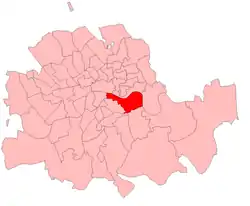 Rotherhithe in London 1885–1918 | |
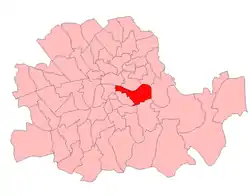 Rotherhithe in London 1918–50 | |
| 1885–1950 | |
| Number of members | one |
| Replaced by | Bermondsey |
| Created from | Southwark |
The constituency was created for the 1885 general election, and abolished for the 1950 general election when it became part of the revived Bermondsey constituency.
Boundaries
1885-1918

The Metropolitan Borough of Bermondsey wards of St Olave's, St John's, St Thomas's, St Mary, Rotherhithe and St Mary Magdalen, Bermondsey.[1]
1918-1950
The Metropolitan Borough of Bermondsey wards of St John, St Olave, Bermondsey five and six, and Rotherhithe one, two and three.
Members of Parliament
| Election | Member | Party | |
|---|---|---|---|
| 1885 | Charles Hamilton | Conservative | |
| 1892 | John Macdona | Conservative | |
| 1906 | Hubert Carr-Gomm | Liberal | |
| 1918 | John Lort-Williams | Unionist | |
| 1923 | Ben Smith | Labour | |
| 1931 | Norah Runge | Conservative | |
| 1935 | Ben Smith | Labour | |
| 1946 b-e | Bob Mellish | Labour | |
| 1950 | Constituency abolished | ||
Election results
| Decades: |
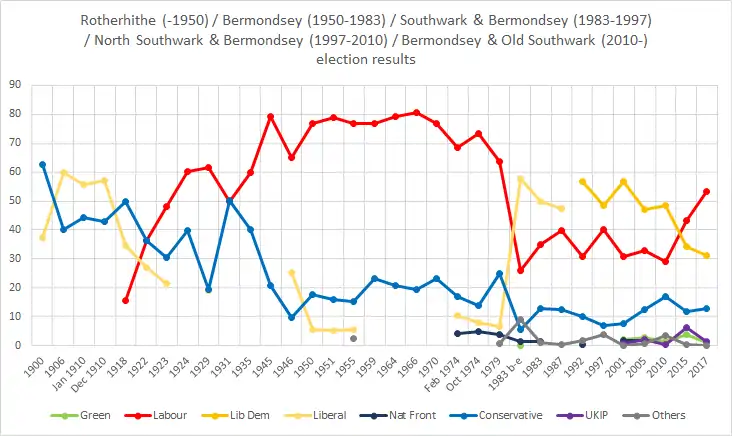
Elections in the 1880s
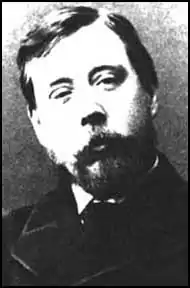
| Party | Candidate | Votes | % | ±% | |
|---|---|---|---|---|---|
| Conservative | Charles Hamilton | 3,327 | 54.3 | ||
| Lib-Lab | Richard Pankhurst | 2,800 | 45.7 | ||
| Majority | 527 | 8.6 | |||
| Turnout | 6,127 | 72.5 | |||
| Registered electors | 8,455 | ||||
| Conservative win (new seat) | |||||
| Party | Candidate | Votes | % | ±% | |
|---|---|---|---|---|---|
| Conservative | Charles Hamilton | 3,202 | 60.2 | +5.9 | |
| Liberal | William Brampton Gurdon | 2,115 | 39.8 | -5.9 | |
| Majority | 1,087 | 20.4 | +11.8 | ||
| Turnout | 5,317 | 62.9 | -9.6 | ||
| Registered electors | 8,455 | ||||
| Conservative hold | Swing | +5.9 | |||
Elections in the 1890s
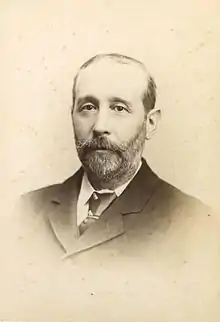
| Party | Candidate | Votes | % | ±% | |
|---|---|---|---|---|---|
| Conservative | John Macdona | 3,995 | 59.1 | -1.1 | |
| Liberal | Harold Glanville | 2,765 | 40.9 | +1.1 | |
| Majority | 1,230 | 18.2 | -2.2 | ||
| Turnout | 6,760 | 70.1 | +7.2 | ||
| Registered electors | 9,638 | ||||
| Conservative hold | Swing | -1.1 | |||
| Party | Candidate | Votes | % | ±% | |
|---|---|---|---|---|---|
| Conservative | John Macdona | 4,092 | 64.6 | +5.5 | |
| Liberal | Ambrose Pomeroy | 2,246 | 35.4 | -5.5 | |
| Majority | 1,846 | 29.2 | +11.0 | ||
| Turnout | 6,338 | 69.0 | -1.1 | ||
| Registered electors | 9,188 | ||||
| Conservative hold | Swing | +5.5 | |||
Elections in the 1900s
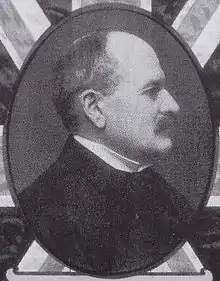
| Party | Candidate | Votes | % | ±% | |
|---|---|---|---|---|---|
| Conservative | John Macdona | 3,938 | 62.6 | -2.0 | |
| Liberal | Thomas Hart-Davies | 2,356 | 37.4 | +2.0 | |
| Majority | 1,582 | 25.2 | -4.0 | ||
| Turnout | 6,294 | 65.8 | -3.2 | ||
| Registered electors | 9,559 | ||||
| Conservative hold | Swing | -2.0 | |||
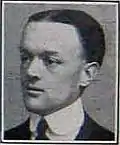
| Party | Candidate | Votes | % | ±% | |
|---|---|---|---|---|---|
| Liberal | Hubert Carr-Gomm | 4,192 | 59.8 | +22.4 | |
| Conservative | John Macdona | 2,821 | 40.2 | -22.4 | |
| Majority | 1,371 | 19.6 | N/A | ||
| Turnout | 7,013 | 80.6 | +14.8 | ||
| Registered electors | 8,700 | ||||
| Liberal gain from Conservative | Swing | +22.4 | |||
Elections in the 1910s
| Party | Candidate | Votes | % | ±% | |
|---|---|---|---|---|---|
| Liberal | Hubert Carr-Gomm | 4,474 | 55.6 | -4.2 | |
| Conservative | Assheton Pownall | 3,570 | 44.4 | +4.2 | |
| Majority | 904 | 11.2 | -8.4 | ||
| Turnout | 8,044 | 84.3 | +3.7 | ||
| Liberal hold | Swing | -4.2 | |||
| Party | Candidate | Votes | % | ±% | |
|---|---|---|---|---|---|
| Liberal | Hubert Carr-Gomm | 4,030 | 57.1 | +1.5 | |
| Conservative | Assheton Pownall | 3,026 | 42.9 | -1.5 | |
| Majority | 1,004 | 14.2 | +3.0 | ||
| Turnout | 7,056 | 74.0 | -10.3 | ||
| Liberal hold | Swing | +1.5 | |||
General Election 1914/15:
Another General Election was required to take place before the end of 1915. The political parties had been making preparations for an election to take place and by the July 1914, the following candidates had been selected;
- Liberal: Hubert Carr-Gomm
- Unionist:
| Party | Candidate | Votes | % | ±% | |
|---|---|---|---|---|---|
| C | Unionist | John Lort-Williams | 5,639 | 50.0 | +7.1 |
| Liberal | Hubert Carr-Gomm | 3,889 | 34.5 | -22.6 | |
| Labour | Will Godfrey | 1,750 | 15.5 | New | |
| Majority | 1,750 | 15.5 | N/A | ||
| Turnout | 25,088 | 45.1 | -28.9 | ||
| Unionist gain from Liberal | Swing | +14.8 | |||
| C indicates candidate endorsed by the coalition government. | |||||
Election in the 1920s
| Party | Candidate | Votes | % | ±% | |
|---|---|---|---|---|---|
| Unionist | John Lort-Williams | 6,749 | 36.5 | -13.5 | |
| Labour | Charles Diamond | 6,703 | 36.3 | +21.8 | |
| Liberal | Hubert Carr-Gomm | 5,034 | 27.2 | -7.3 | |
| Majority | 46 | 0.2 | -15.3 | ||
| Turnout | 29,166 | 63.4 | +18.3 | ||
| Unionist hold | Swing | -17.6 | |||
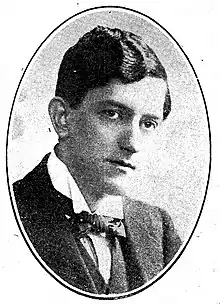
| Party | Candidate | Votes | % | ±% | |
|---|---|---|---|---|---|
| Labour | Ben Smith | 9,019 | 48.0 | +11.7 | |
| Unionist | John Lort-Williams | 5,741 | 30.5 | -6.0 | |
| Liberal | Richard Hazleton | 4,035 | 21.5 | -5.7 | |
| Majority | 3,278 | 17.5 | N/A | ||
| Turnout | 29,457 | 63.8 | +0.4 | ||
| Labour gain from Unionist | Swing | +8.8 | |||
| Party | Candidate | Votes | % | ±% | |
|---|---|---|---|---|---|
| Labour | Ben Smith | 12,703 | 60.3 | +12.3 | |
| Unionist | Charles Garfield Lott Du Cann | 8,375 | 39.7 | +9.2 | |
| Majority | 4,328 | 20.6 | +3.1 | ||
| Turnout | 29,906 | 70.5 | +6.7 | ||
| Labour hold | Swing | +1.5 | |||
| Party | Candidate | Votes | % | ±% | |
|---|---|---|---|---|---|
| Labour | Ben Smith | 14,664 | 61.6 | +1.3 | |
| Unionist | Gurney Braithwaite | 4,594 | 19.3 | -20.4 | |
| Liberal | Dora West | 4,556 | 19.1 | New | |
| Majority | 10,070 | 42.3 | +21.7 | ||
| Turnout | 36,133 | 65.9 | -0.6 | ||
| Labour hold | Swing | +10.8 | |||
Election in the 1930s
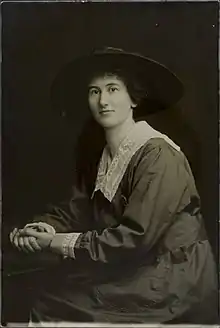
| Party | Candidate | Votes | % | ±% | |
|---|---|---|---|---|---|
| Conservative | Norah Runge | 11,666 | 50.3 | +31.0 | |
| Labour | Ben Smith | 11,536 | 49.7 | -11.9 | |
| Majority | 130 | 0.6 | N/A | ||
| Turnout | 36,111 | 64.3 | -1.6 | ||
| Conservative gain from Labour | Swing | +21.4 | |||
| Party | Candidate | Votes | % | ±% | |
|---|---|---|---|---|---|
| Labour | Ben Smith | 14,416 | 59.7 | +10.0 | |
| Conservative | Norah Runge | 9,751 | 40.3 | -10.0 | |
| Majority | 4,665 | 19.4 | N/A | ||
| Turnout | 33,899 | 71.3 | +7.0 | ||
| Labour gain from Conservative | Swing | +10.0 | |||
Election in the 1940s
| Party | Candidate | Votes | % | ±% | |
|---|---|---|---|---|---|
| Labour | Ben Smith | 9,741 | 79.1 | +19.4 | |
| Conservative | Norah Runge | 2,577 | 20.9 | -19.4 | |
| Majority | 7,164 | 58.2 | +38.8 | ||
| Turnout | 18,098 | 68.1 | -3.2 | ||
| Labour hold | Swing | +19.4 | |||
| Party | Candidate | Votes | % | ±% | |
|---|---|---|---|---|---|
| Labour | Bob Mellish | 7,365 | 65.0 | -14.1 | |
| Liberal | Edward Martell | 2,821 | 25.3 | New | |
| Conservative | Frederick Burden | 1,084 | 9.7 | -11.2 | |
| Majority | 4,444 | 39.7 | -18.5 | ||
| Turnout | 21,952 | 50.9 | -17.2 | ||
| Labour hold | |||||
In fiction
The constituency is portrayed in an episode (A Place in the World) of TV drama series Upstairs, Downstairs as the safe Docklands Labour seat of "Rotherhithe East" that is unsuccessfully contested by James Bellamy for the Conservatives in a by-election in 1920. Location scenes were actually shot in Rotherhithe in January 1975 during the making of the episode. (In real life through 1920 Rotherhithe was a Unionist seat.)
References
- Debrett's House of Commons & Judicial Bench, 1886
- British Parliamentary Election Results 1885–1918, FWS Craig
- The Liberal Year Book, 1907
- Debrett's House of Commons & Judicial Bench, 1901
- Debrett's House of Commons & Judicial Bench, 1916
- British Parliamentary Election Results 1918–1949, FWS Craig
- The Times, 19 November 1946